When Do Golden Retrievers Calm Down?
Anyone that has raised puppies knows that they are a lot of fun, but they can be a heck of a lot of work! Chewing up everything, having loads of accidents in the house and zooming around constantly underfoot, and running into things are part and parcel of puppyhood.
Playful, mischievous, and always up-to-no-good, the puppy years of a Golden Retriever life can be some of the most fun periods but can also be frustrating for new dog owners.
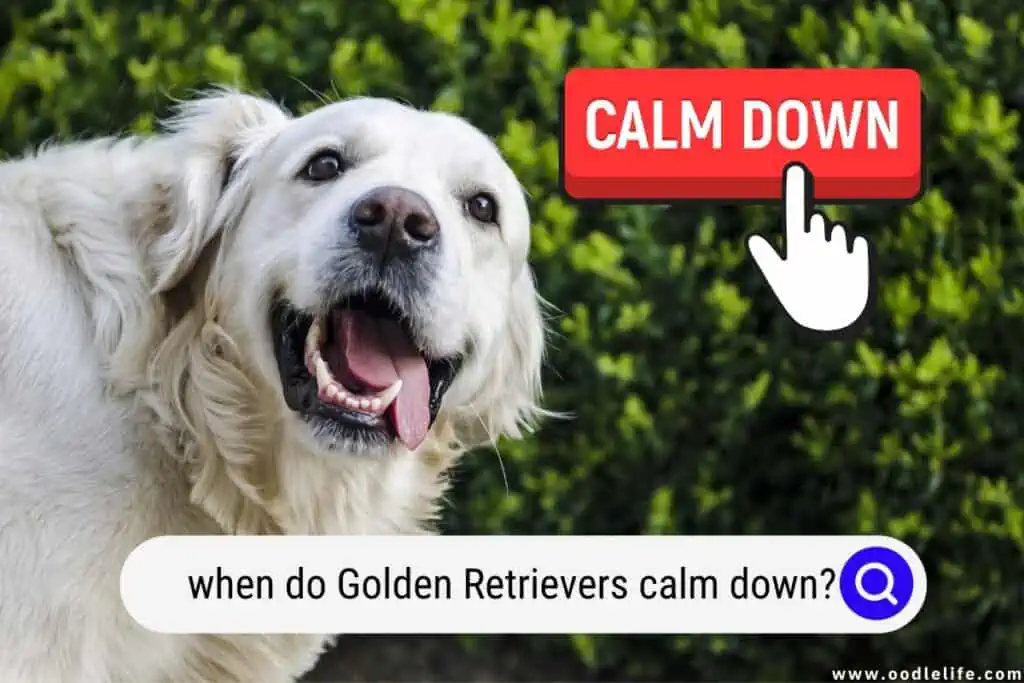
Golden Retrievers can be very hyperactive and high energy during their puppy years, this is because they are a curious breed and considered intelligent dogs so they want to explore and get into everything around them.
In this blog post, we’ll take a closer look at when Golden Retrievers calm down and what you can do in the meantime to avoid being driven mad!
At What Age Do Golden Retrievers Calm Down?
Golden Retrievers will start to calm down at the age of two or three years old. There are many factors that can affect this, such as maturity level, confidence in themselves, and the chemical balance inside their body.
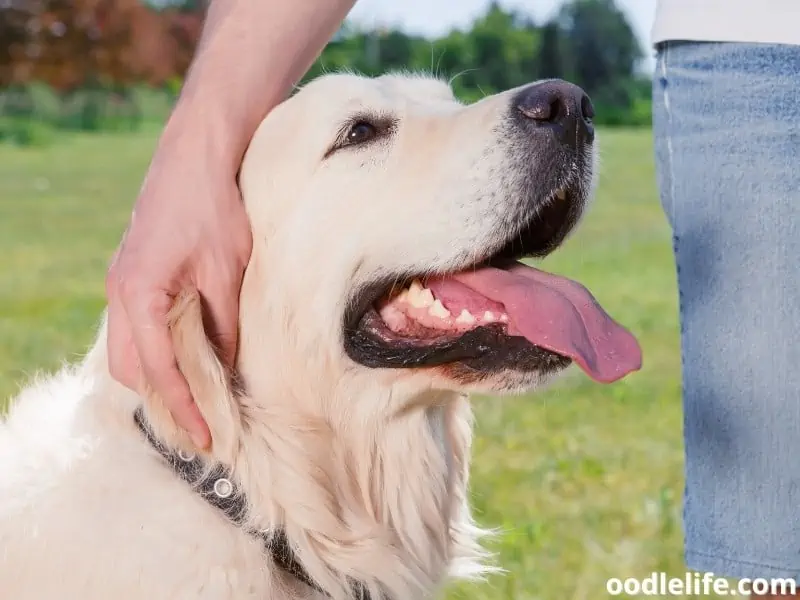
All dogs are unique and must be treated as such because their personality will affect their behavior as well. When they calm down depends on how fast they will go through their puppy stages, the faster they go through them, the faster they will calm down.
Some may calm down only when they reach four years and some never outgrow their puppy phase and will remain mischievous rascals for the majority of their lives!
Why Are Some Goldens So Hyper?
One of the reasons they are hyper during their puppy years is that Golden Retrievers are naturally athletic dogs who love the outdoors, socializing, and exercising.
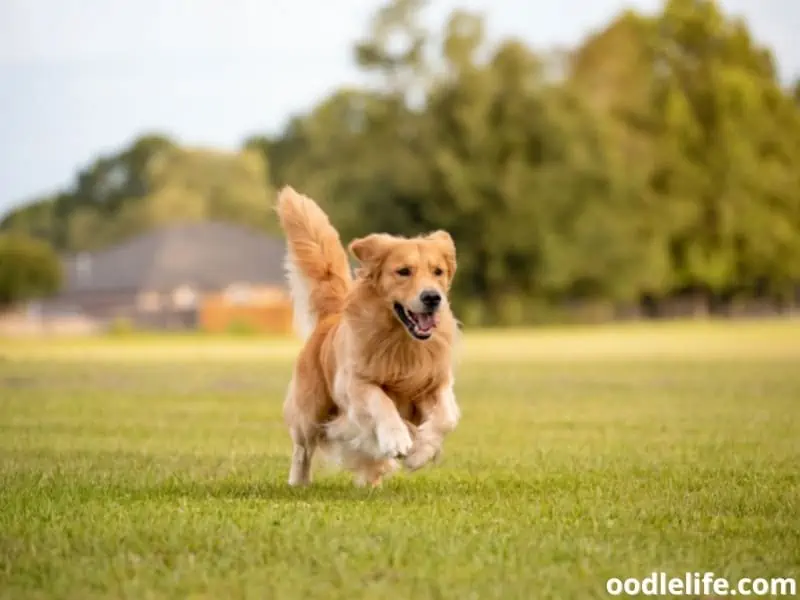
Golden Retrievers are sporting dogs with moderate to high energy levels compared to some other breeds that might be content being indoor pets.
Golden Retrievers need at least an hour of intense exercising daily. Whether it’s playing or hiking outside, dashing around in a game of fetch, or going for a run, they need plenty of physical activity to stay happy.
Working Goldens are excellent choices for hunting and service dogs thanks to their intelligence, curiosity, and high amount of energy.
True to their name Golden Retrievers will retrieve anything that’s been given to them. Indulging them in a vigorous game of fetch might be able to keep most Goldens happy.
If they don’t have an adequate amount of outdoor activity and exercise, they will have pent-up energy and this could manifest in many unwanted behaviors like excessive barking or destructive chewing or digging.
This is especially important for those who spend a lot of time indoors with a bored Golden. Your young dog could be simply bored and decide to tear up your shoes, jump on everything, and ransack your bedroom.
For them to be their true curious and playful selves, it’s only natural for Golden Retrievers to go through this puppy phase before coming into adulthood after two or three years.
This important stage of their development is the equivalent to a human’s adolescence and is when a dog defines its personality and learns more about the environment they live in.
The good news is Golden Retrievers are one of the most intelligent dog breeds, so they can be easy to train. Even if they have a lot of energy, with the right training and activity they will eventually calm down and become more mature.
As their owner, it is your responsibility to make sure they are trained and have gone through the puppy phases properly so that they’ll be well-socialized, balanced, and have awesome temperaments the way Goldens are supposed to.
With the right home, owner, and environment, the process of maturing can be faster and your Golden Retrievers puppy can calm down sooner.
A Golden Retriever’s Puppy Years
Golden Retrievers are playful and curious dogs by nature, especially during the puppy years. The puppy stages go from their neonatal phase until their adolescence and adulthood stages.
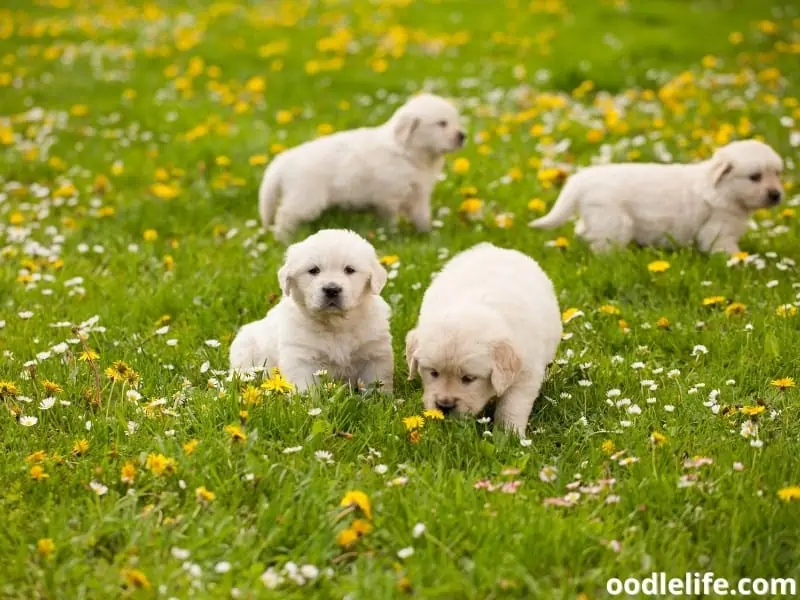
The puppy stages are the newborn stage, transitional stage, socialization stage, ranking stage, adolescent stage, and finally adulthood at around two or three years old.
Their playful puppy years will start around the socialization stage, which is around 12 weeks of age when they start to be curious, running, and getting to know their environment. Coincidentally, this is also the age when they are usually taken home after adoption or slightly after.
They’ll be incredibly curious and would want to gather more information on the people and other animals that are around them.
As the stage name says, they will start to socialize with the world around them.
Another factor that they will also experience after their socialization stage is teething during the ranking stage at about three to six months. When they enter the ranking stage, they will be biting on furniture and shoes because their teeth are growing and might be causing them some discomfort.
When they reach this age, give them loads of chew toys and also solid, chewy food which could make them calmer and divert their attention from your shoes and furniture.
The ranking stage is when you want to start training your Golden Retrievers. Because this is when they start to understand where they stand in their environment and learn about submission and dominance.
They can start to show rebellious behavior during this stage when they are testing their boundaries to see where they rank as a family member.
However, Golden Retrievers tend towards being very affectionate with their paw parents, so there is a good chance that they will skip being a rebel and stay obedient to please you because your validation is important.
Then they will go through the adolescent stage. The stage will start after 6 months of age until they are 18 months old. This is the pesky part when they REALLY want to test their limits and push your boundaries (and patience!)
They will start exerting more dominance as they reach sexual maturity at about 5 to 8 months, especially if they are left unneutered or unspayed. They’ll also be going through another chewing phase in months 7 and 9, so be ready with new sets of chewing toys!
Although it might be a little tiring and frustrating for you, you need to have trust that they will go through this puppy phase.
What Can You Do To Make Your Golden Retrievers Calmer?
There are several ways that you can do to calm down and train your Golden Retrievers so that they can go through their puppy phase while you stay relatively sane.
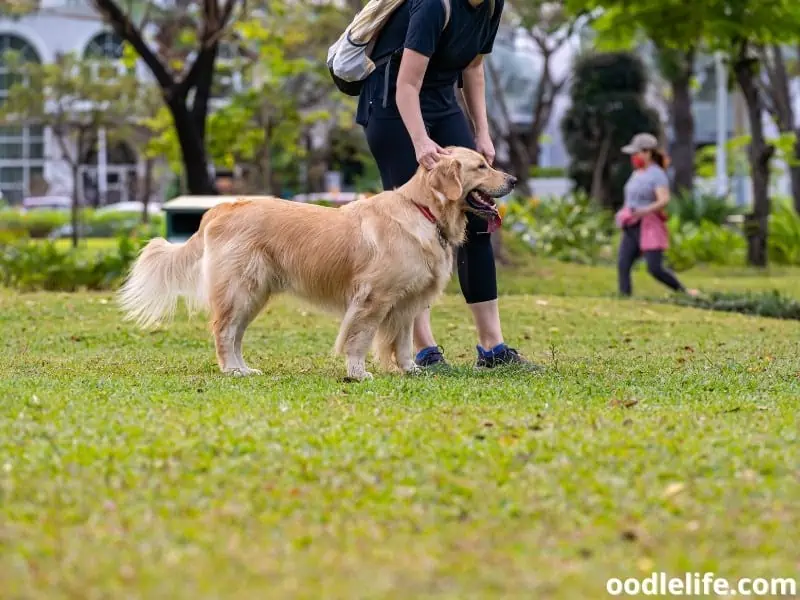
First of all, make sure that you have a positive environment to raise your Golden Retrievers. You need to make them feel safe during their socialization phase because failure to do so will make them anxious, defensive, and aggressive.
Avoid keeping them in crates for long periods, because this will make them frustrated. They are active dogs that need room to communicate their puppy exuberance. Make sure you provide them with a safe place to rest, nutritious food, plenty of water to drink, and lots of love from your family.
Try to provide sufficient mental and physical stimulation for them. Golden Retrievers have been shown to enjoy participating in obedience and agility events, so this might be something you want to think about.
Aside from making them understand how things work in life and preparing them for adulthood, giving them regular mental and physical stimulations can also help you calm them down a little bit in their puppy phase so they will have an outlet to spend all of their pent-up energy.
This way, even if they might still be hyperactive and in their puppy phase, you’ll still get some time off when they are resting after doing all the activities. Make sure your young puppy has at least 15 minutes of active physical exercise twice every day to keep them busy.
Older puppies can have an hour’s exercise a day and plenty of playtime and games of fetch in between.
You should also start training your Golden Retrievers by giving them commands and treats, this will establish their position in the family during their ranking stage. It will also create a bond between you and your pet.
If you’re not confident to do it yourself, you can also hire a professional to train your dog. But when you’re at home, it’s your job to keep them disciplined so that they will grow up to be dependable adult dogs.
Lastly, spaying and neutering your dog can also calm them down, especially during their adolescent phase. This reduces testosterone and hormones that can lead to unwanted behaviors like escape attempts in search of a mate.
Conclusion
Most dog parents know that puppyhood is a joy that lasts SUCH a short time, so while it can be frustrating and you’ll have your patience tried millions of times, go with the flow and enjoy it!
Nothing beats the cheeky eyes of a Golden puppy sitting amidst complete chaos in happy contentment, without the slightest idea what he did wrong!